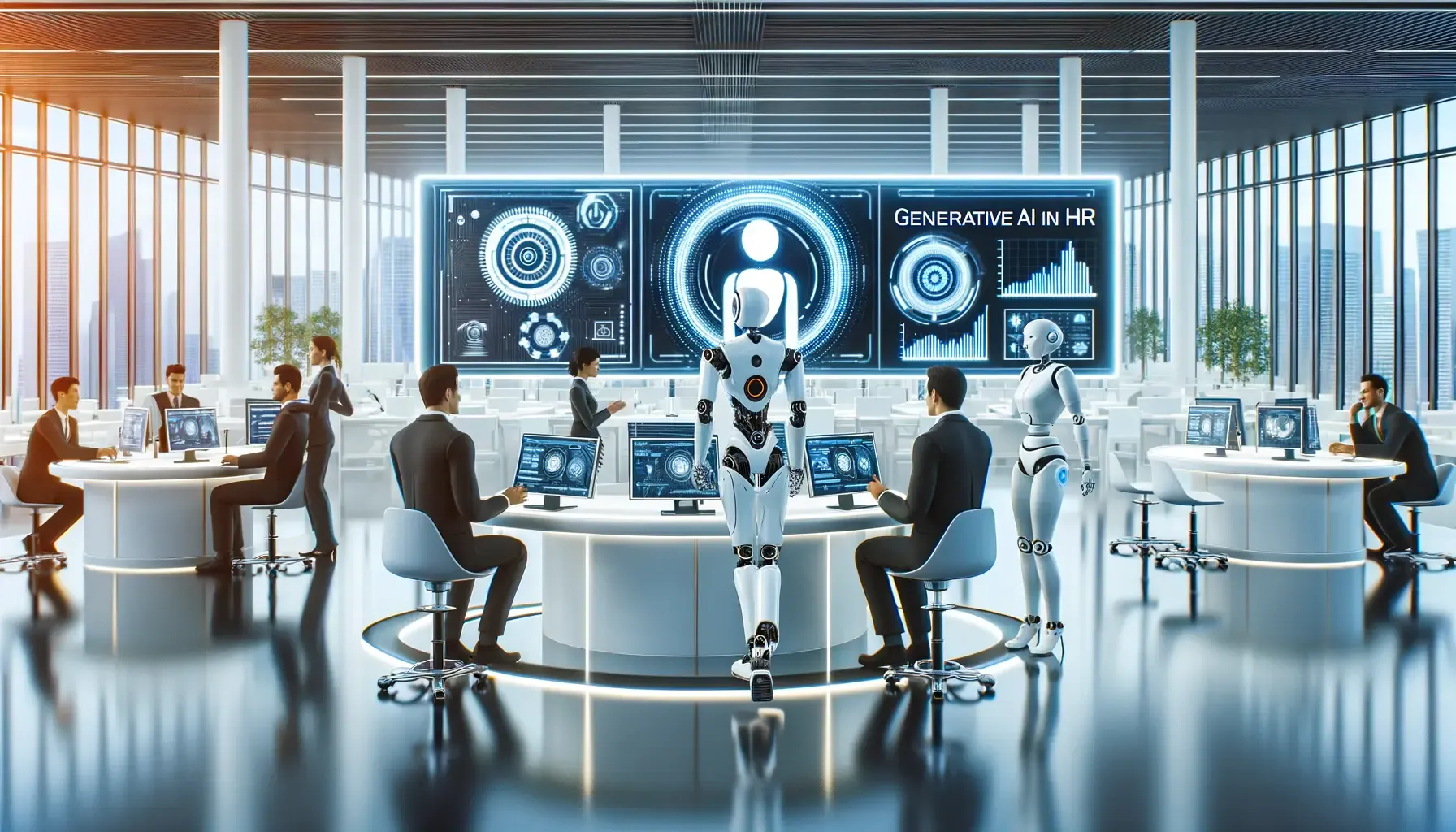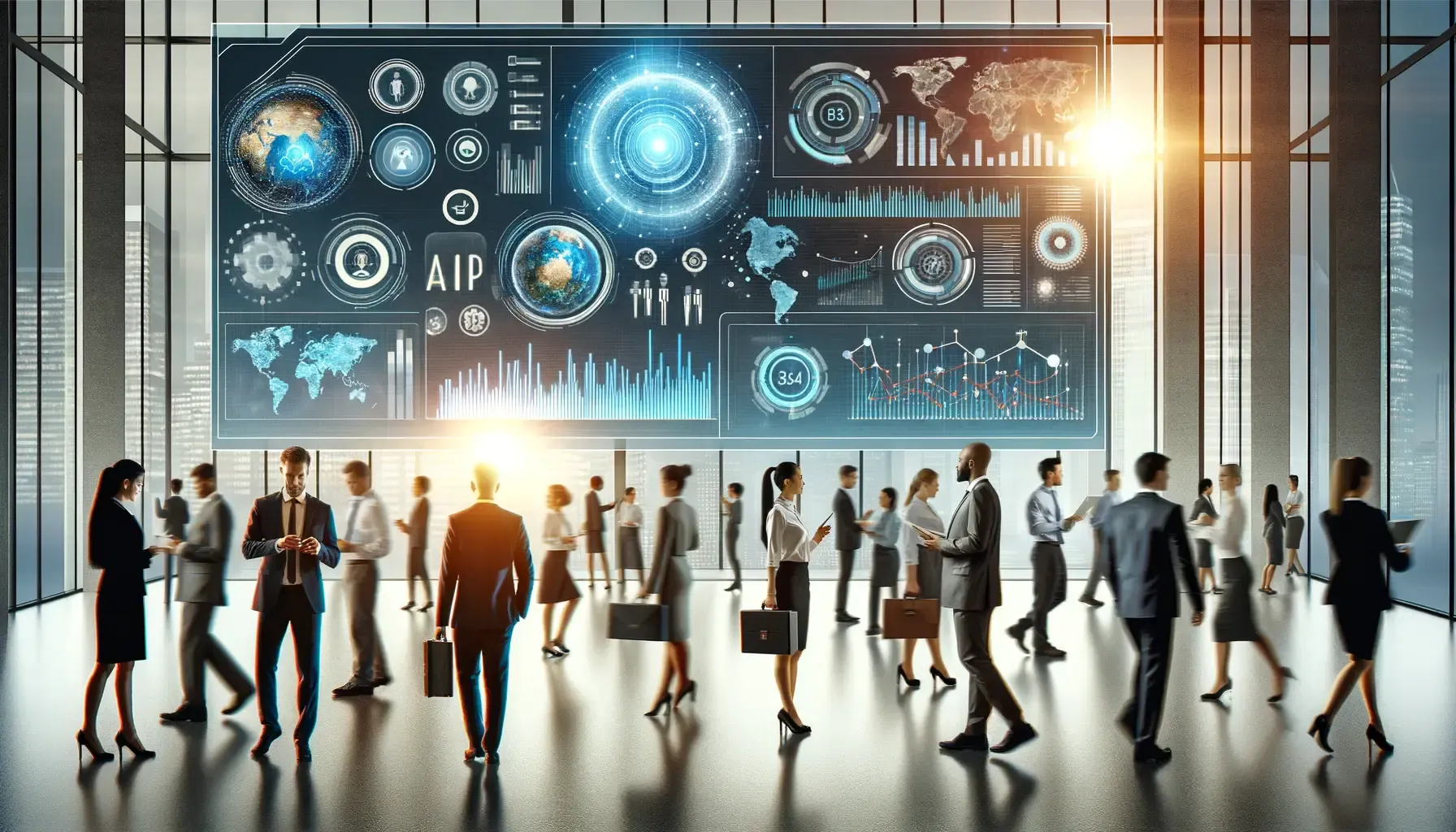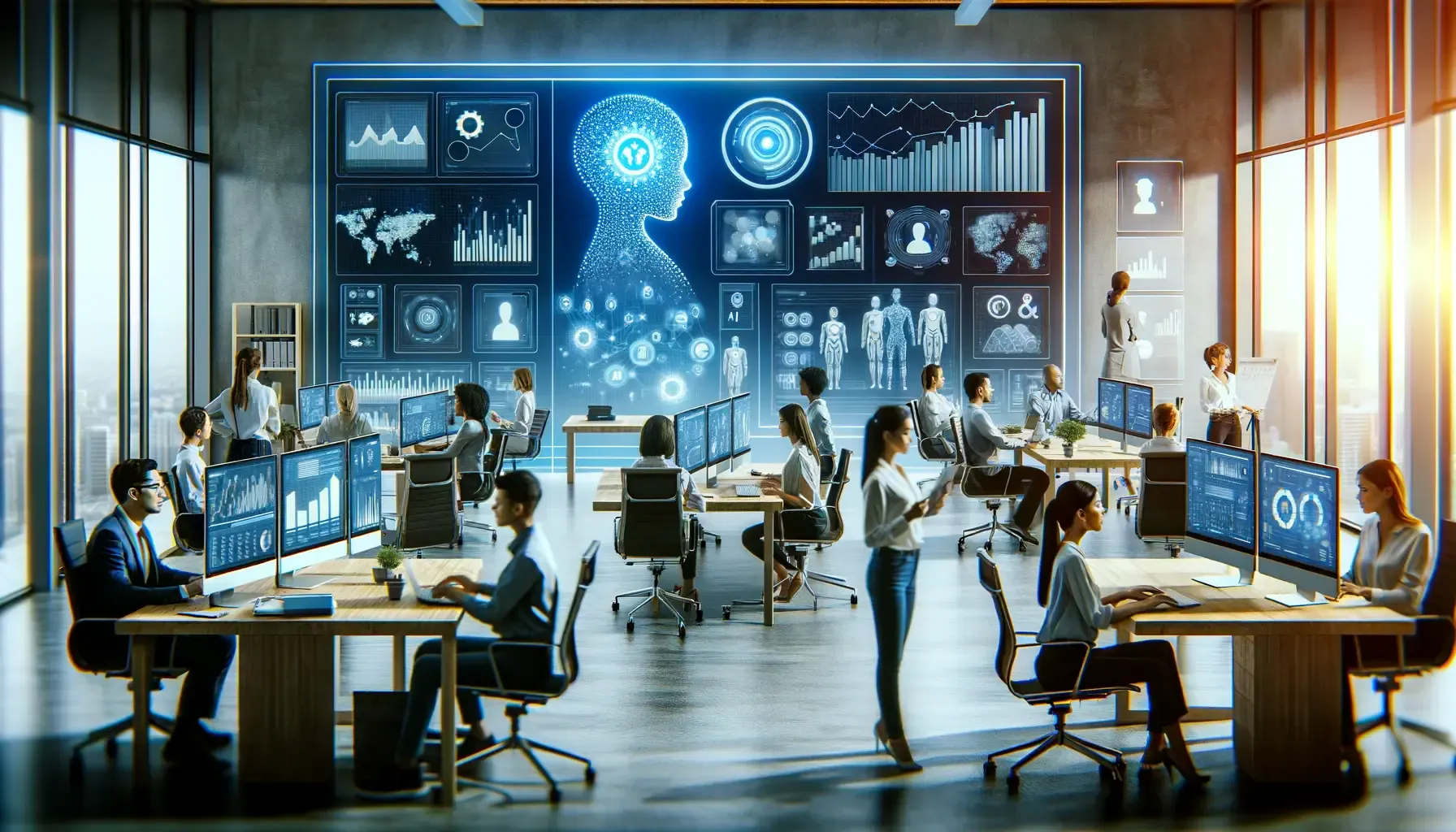Table of Contents
Generative AI is a cutting-edge subset of artificial intelligence that focuses on creating new, synthetic instances of data that can include text, images, sounds, and videos. This is achieved through complex algorithms known as generative models, which analyze and learn from vast datasets to produce new content that is similar but not identical to what they have been fed.
The most popular generative models, such as Generative Adversarial Networks (GANs) and Variational Autoencoders (VAEs), have been used to compose music, write articles, develop software code, and design virtual environments. Their capacity to innovate and ‘generate’ rather than simply ‘analyze’ or ‘predict’ is what makes Generative AI in HR a game-changer in various sectors.
Generative AI in HR
Generative AI in HR refers to the application of artificial intelligence technologies that can generate new content, insights, and solutions within the human resources domain. These AI systems learn from data, patterns, and inputs to create output that is predictive, prescriptive, and innovative, going beyond the capabilities of traditional data analytics tools.

The Importance of AI in Modern HR
In the realm of human resources, AI has transitioned from a futuristic concept to a fundamental component of strategic operations. It augments HR capabilities in addressing complex, voluminous tasks with precision and insight that was previously unattainable.
By automating routine tasks, AI allows HR professionals to focus on more strategic, high-value functions that require human empathy and judgment. Moreover, AI’s predictive analytics power helps in making informed decisions about talent management, workforce planning, and employee engagement, which are critical in shaping a productive and satisfied workforce.
1. Generative AI in HR: Transforming Talent Acquisition
AI-driven Talent Acquisition: Generative AI in HR significantly enhances talent acquisition by employing sophisticated algorithms to analyze the vast array of candidate data available. This includes not just resumes and professional profiles but also data points from various digital footprints that candidates leave online.
By assessing this information, AI can identify patterns and insights that correlate with successful employees. It can predict candidate success in specific roles and even highlight those who may be passive job seekers but are an ideal fit. AI-driven systems can also generate job postings that are optimized for search engines, ensuring they reach the most qualified candidates.
Enhancing Candidate Experience through Personalized Interactions: Generative AI in HR can craft personalized communication with candidates at scale, from initial contact to interview scheduling. AI chatbots, for instance, can provide instant responses to candidate inquiries, schedule interviews, and even offer personalized feedback on applications. This tailored approach not only improves the candidate experience but also builds a positive employer brand. Personalization continues post-hire, where AI systems can create customized onboarding experiences based on the new hire’s role, department, and work history.
Automating Administrative Tasks in Onboarding: The onboarding process involves a multitude of administrative tasks that can be streamlined through Generative AI in HR. By automating the completion of paperwork, scheduling of training sessions, and assignment of mentors, AI frees up HR professionals to focus on the human aspect of the onboarding experience. AI can also generate helpful resources for new hires, such as personalized guides or checklists, and set up automated reminders for important milestones during the onboarding process.
2. Learning and Development Enhanced by Generative AI in HR
Customized Learning Experiences: Generative AI in HR can tailor learning and development to the individual needs of employees by analyzing their past performance data, learning pace, preferred methods of learning, and even their future roles and aspirations. It can create personalized learning modules, recommend courses, and adjust training paths in real time to optimize learning outcomes.
Predictive Analysis for Career Pathing: Through predictive analytics, AI can forecast future career paths and necessary competencies for each role. This enables employees to prepare for future opportunities within the company, ensuring they are developing in line with both their personal career goals and the company’s strategic objectives.
Real-time Skills Gap Assessment: Generative AI in HR can continually assess the skills of the workforce and compare them to those required for current and future roles. By identifying skills gaps in real-time, it can recommend immediate training interventions, ensuring that the workforce remains competitive and ready to meet the company’s evolving needs.

3. Employee Engagement Revolutionized by Generative AI in HR
Sentiment Analysis in Employee Feedback: Using natural language processing, Generative AI in HR can analyze employee feedback from surveys, emails, and even social media to gauge morale, engagement, and overall satisfaction. This helps HR to understand the sentiment behind employee communications and act on them promptly.
Personalized Benefits and Rewards Systems: AI can design personalized benefits packages and rewards systems by analyzing individual employee data. This not only increases the perceived value of such programs but also contributes to higher employee satisfaction and retention.
Predictive Attrition Modeling: By analyzing patterns in employee data, Generative AI in HR can predict which employees are at risk of leaving the company. This allows HR to proactively engage with these employees and address their concerns, potentially preventing costly turnover.
4. Performance Management Transformed: Utilizing Generative AI
Continuous Performance Tracking: Generative AI in HR enables a shift from periodic to continuous performance tracking by analyzing multiple data points in real time. This allows for more frequent, timely, and relevant feedback, which can improve employee performance and engagement.
AI Coaching for Managers and Employees: AI can provide personalized coaching to both managers and employees, offering advice on leadership, communication, and other skills based on the analysis of performance data. This fosters a culture of continuous learning and improvement.
Data-driven Performance Evaluations: AI can aggregate and analyze performance data to support more objective, data-driven evaluations. This helps to eliminate biases and provides a more comprehensive view of an employee’s contributions.
Integrating Gen AI into HR Policy
Ethical Considerations: As AI becomes more prevalent in HR, it’s crucial to address ethical concerns, particularly around the use of employee data and the potential for AI to make decisions that affect employees’ lives and careers.
Data Privacy and Protection: Ensuring the privacy and security of employee data is paramount. Generative AI in HR must be implemented with stringent data protection measures to maintain trust and comply with regulations.
Fostering an AI-augmented Workplace Culture: Adopting Generative AI in HR requires a cultural shift towards an AI-augmented workplace, where technology and humans work in tandem to achieve better outcomes.
Case Studies
These case studies highlight the practical applications and benefits of Generative AI in HR. Companies leveraging these technologies are witnessing substantial improvements in efficiency, employee satisfaction, and retention, proving that Generative AI in HR is not just a theoretical advancement but a practical tool reshaping the HR landscape.
Case Study 1: Customized Employee Onboarding
A multinational retail corporation, “Global Retail Corp.,” introduced a Generative AI in the HR system to personalize the onboarding experience for new employees. The system generates individualized onboarding plans based on the employee’s role, location, and previous work experience. It also schedules necessary training sessions and monitors progress. Since its implementation, Global Retail Corp. has seen a marked improvement in new employee satisfaction and a reduction in early turnover rates.
Case Study 2: Dynamic Performance Management System
“NextGen Solutions,” a software development company, revolutionized its performance management system using continuous performance tracking enabled by AI. The system provides managers and employees with real-time feedback, which allows for immediate adjustments and supports personal growth. This has led to a more agile and responsive workforce, with higher productivity and employee satisfaction.

Conclusion: The Transformative Power of Generative AI in HR
The case studies presented illustrate that these strategies are not merely theoretical but are actively being utilized by forward-thinking companies to achieve remarkable outcomes. From reduced time-to-hire to enhanced employee satisfaction and retention, the real-world impacts of Generative AI in HR are tangible and transformative.
The integration of Generative AI into Human Resources marks a pivotal shift in how organizations attract, retain, and develop talent. This article has traversed the multifaceted landscape where AI-driven strategies have revolutionized talent acquisition, personalized the onboarding experience, democratized learning and development, and redefined employee engagement and performance management.
Personalized onboarding experiences have been shown to foster a sense of belonging and commitment from the outset of employment. Tailored learning and development initiatives driven by AI have empowered employees to take charge of their growth, aligning individual aspirations with organizational needs.
Sentiment analysis and predictive modeling have provided unprecedented insights into employee engagement, allowing for preemptive measures to enhance satisfaction and retention. Moreover, continuous performance tracking and AI coaching have cultivated a culture of ongoing feedback and professional development.
The strategies outlined in this discourse as a roadmap to guide your integration of AI into HR. Embrace the data-driven insights that AI offers, and let them inform your policies and practices. Be proactive in addressing the ethical, privacy, and legal implications of AI deployment. And cultivate a workplace culture that celebrates the synergy between human intuition and AI’s analytical prowess.
The future of HR is undeniably intertwined with Generative AI. By leveraging its capabilities, you can not only transform your HR policies but also contribute to a more dynamic, inclusive, and prosperous workplace. Now is the time to step into the vanguard of HR innovation, where Generative AI is not just an option but an imperative for success.